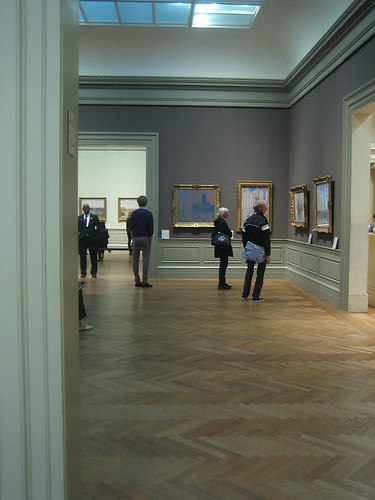However, to show artwork in these alternative galleries can have many complications the professionals in commercial galleries would have anticipated and prevented before they emerge.
Over the years, I have showed my works in places including commercial galleries, co-op galleries, office buildings, restaurants and gyms. The experiences I had were mostly positive but there were some bumps I'd rather avoided if I had known better.
Overall, when working with alternative galleries, artists need to be both flexible and firm, be pleasant but exercise good judgment, and watch out for things particularly regarding the contracts.
Alternative galleries are doing you a favor to let you show your work, therefore be grateful and courteous. However, they might not be experiences in handling and caring your artworks and you must judge what risks you are willing to take for what gain.
Once, I agreed to let some new cafe owners to show my work. On day of delivery, she and her helper showed up with an open truck and thick ropes to transport my works. I decided to honor my agreement and not to cancel the show, despite my dismay. It turned out to be a mistake. They stacked my works tightly together and rather seriously damages a few paintings which are not bone dry yet. Attempt to collect some damages went nowhere. Therefore I learned my lesson.
Trust your instinct. If you feel something does not go right - demand the change or cancel the show - you are under no obligation to show there, unless you are contractually compelled to. This brought up the topic of contract.
Many alternative galleries have no contract and the mere mentioning it can stop the whole business altogether. What you want from the contract, mostly the insurance of your work. Ask if your works are covered by their existing insurance or not. If not, is it possible to add a rider to cover them? If not, would you risk of some damage or total loss? If you judge the extra line on your resume is a compelling reason to go forward, then do it. If not, and if you don't minding burning your bridge and don't believe the management of the alternative gallery has the means to destroy your fledgling career, then walk out.
I had a very interesting experience with an alternative gallery which had shown artworks before. Before delivery, I was assured that my paintings would be insured. However, upon delivery, I was handed a form to sign - an agreement not to hold the place any responsibility of anything happened to my work.
It was clearly not we had agreed upon and I mentioned the damages to my work in other place and how uncomfortable I was with the form. I was polite but firm. I asked them to find out if their insurance would cover any damages to my work or not. I waited for an hour and it was confirmed, luckily. Even more so, I prepared a contract of my own, based on an established gallery, and the management of that place was not hesitating in signing my contract.
Another thing you should ask the management is if you can remove and replace a certain piece during the agreed-upon exhibition period, in case you need it to be somewhere else. Usually, the management would not mind but it is polite to ask, instead of assuming.






No comments:
Post a Comment